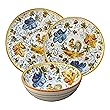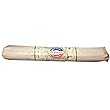
Souvenir Shopping Guide: 16 Unique Products to Buy in Florence
1. Pottery
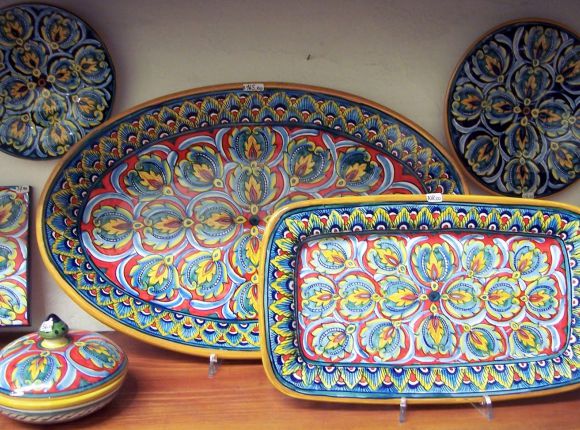
Montelupo’s design is particularly traditional and rustic, while Deruta’s patterns (also displayed at La Botteghina’s) are more geometric, elaborate and extremely colored. Prices for a medium size pot start at 12 euros (35 euros for a larger one), while the biggest Montelupo or Deruta plate can cost up to 250 euros, and a mediums-size jar - between 50 and 90 euros, depending on the design. La Botteghina is open on Mondays from 3 to 7 pm and Tue-Sat, 9 am-7 pm.
Ceramics jars are also the gifts worth considering. Check out the Ceramiche d’Arte gallery, located in Galleria Ponte Vecchio (entrance from Via De’ Guicciardini, 104/R), whose beautiful hand-painted jars are true masterpieces. Featuring Tuscan landscapes, Chianti hills and their cypresses, fruits and flowers, these jars are ideally designed for storing biscuits, flour, pasta or rice, whilst giving your kitchen the traditional Italian flavor. Prices vary between 45 and 250 euros, depending on the jar designs and sizes. The gallery is open daily from 9 am to 7 pm.
2. Leather Gloves

Designed both for men and women, these gloves are made to perfectly fit everyone’s hand. When new, they must be tight and perfect in length, but not to worry - at Madova, they can find an ideal fit after just a single glance at one's hand. Prices start at 35 euros for the most plain models, and reach up to 200 euros for the most sophisticated and elaborate ones. The Madova store is located at Via De’ Guicciardini 1/R. It is open Mon, Tue, and Sat from 9.30 am to 7.30 pm, and Wed, Thu, Fri from 10.30 am to 7 pm; it is closed on Sundays.
3. Jewels and Gold

Rings, necklaces, bracelets, pendants, earrings and wedding bands bought here will always remind you of this priceless experience through a truly unique precious object. Depending on the stones, the amount of gold used and the design, prices vary considerably, but be aware that for about 100 euros you can buy a nice ring or a cute pendant and, should you buy two (or more) articles, some retailers may offer you a special discount. Shops on Ponte Vecchio open daily from 9 am to 7 pm. A few close on Sunday, but it depends on variable work shifts.
4. Decorative Plates

Holders, lamp bases, jugs, umbrella stands and centerpieces are just the few examples of the pottery they make, but ornamental plates are certainly their true masterpieces. Painted with fruits or flowers, immediately recalling Tuscany (e.g. sunflowers), these plates stand out for their artistic splendor, a result of collaboration between Ricceri and many expert decorators. Entirely painted and shaped by hand, these decorated ceramics reveal the quality and taste of Florentine “master potters”. The Ricceri plates can cost up to 350 euros each, depending on the painted motif. The Ceramiche Ricceri store is located at Via Dei Conti, 14/R and operates Mon 3-7 pm and Tue-Sat 9.30 am-7.00 pm.
5. Florentine Chocolate

The cost for an 80-praline box is about 80 euros. Chocolate bars are also a must at Bianchini’s. Made with equatorial cacao, paprika, cardamom, allspice and Norman salt, the dark chocolate is a true flavor explosion, while the white chocolate - flavored with matcha green tea - is an authentic mixture of cultures. Pricing for a single bar varies between 3.80 and 4.50 euros. Cocoa powder is another possible present you may want to get and share with your family back home, transformed into steaming-hot chocolate cups. You can buy it at 7 euros. La Bottega del Cioccolato is open Mon to Sat (9 am-1 pm), but you can also find Bianchini products at Galanti’s (in Piazza della Libertà), Mon-Sat from 8.30 am to 8 pm (closed Sat afternoon, May through October).
6. GABS Leather Variable-Shape Bags

These handbags’ quality stems from the ancient Florentine passion for detail and handy leather craftsmanship, while their trendy neo-traditional changing shapes draw the attention of the most avid fashion addicts. What’s more, at GABS you can also buy a “do-it-yourself” bag, that is a complete set of ready fabric and leather pieces, including pockets, thread and needle, lining and studs, to make your own personal and unique bag. GABS shops are located at Via Sant’Egidio, 9/R and Via del Parione 35a/R, and are open Mon 3-7.30 pm, and Tue-Sat from 10.30 am to 1.30 pm and from 2.30 to 7.30 pm. Pricing starts at 90 euros, with a medium-size bag costing around 130 euros; the prices vary according to the size and the number of shapes a bag can be turned into).
7. Bemer’s Shoes

Men’s made-to-measure and prêt-à-porter footwear, combining classic designs with a modern flair, have made Bemer’s small workshop (at Borgo San Frediano, 69) a very well-patronized boutique and Stefano Bemer’s name widely recognized as one of the five main shoemakers in Europe, known for their quality and expertise in manufacturing real made-to-measure footwear. Bemer selects only top quality leather obtained from the animals died from natural causes or culled to reduce population (e.g. in African natural reserves). All materials he uses are anti-allergenic and non-synthetic.
Shoes made this way need to be carefully preserved and Stefano Bemer provides his customers with exclusive shoe wax, customized wooden shoe trees to keep the shoes shape unaltered, and special bags to protect the shoes when not in use. His showroom is found at Via di S. Niccolò, 2, and is open Mon from 3 to 7 pm and Tue-Sat, from 9.30 am to 7 pm.
8. Refined Scents, Exquisite Liquers, Soap Bars

This perfume’s name was kept in English as dedicated to the so-called “angels of mud”, hundreds of young foreigners who came to Florence to help rescue victims and save the city’s cultural heritage. Should you be looking for some exquisite liqueurs, try instead “Elisir di rose”, whose original rose flavor makes its taste extremely delicate, as well as “Alkermes”, a highly alcoholic Florentine liqueur, red in color and reputed to have been a secret recipe of the Medici family, which is nowadays specifically used to make “zuppa inglese”, a very typical Italian dessert. Pricing starts at 17.50 euros for the smallest bottle (100 ml). If you’re intended to buy soap bars, you will be spoiled for choice, as they come in tens of possible scents and packagings. Pomegranate or milk single bars (200 gr. each) cost 12 euros. The Farmacia di Santa Maria Novella’s products are amongst the most wanted original presents you may bring home from Florence. Open daily from 9.30 am to 7.30 pm, the Farmacia di Santa Maria Novella is found at Via Della Scala, 16.
9. Passamaneria Toscana Textiles
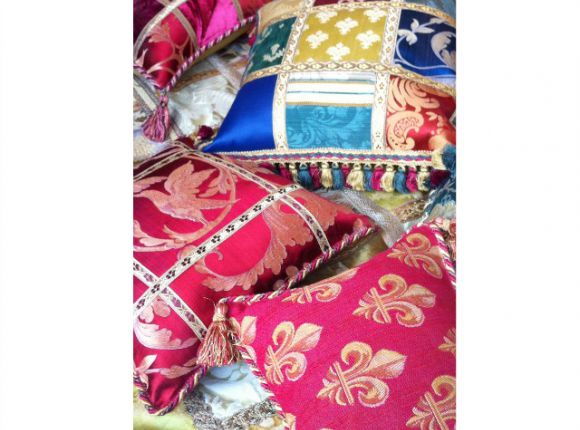
10. Fashion Raincoats

11. Panerai Watches

Retailers may only receive a few limited edition pieces per year each and there are long waiting lists for popular models. In store pricing hardly starts below 3,000 euros and these top-quality watches include models costing up to 15 or even 20 thousand euros, depending on the metals and stones used; sometimes, especially for ancient masterpieces, price is based on collectors’ evaluations, but as a matter of fact, if you want to be noticed, Panerai is the key. Panerai’s boutique in Florence (their very first boutique) is called “Bottega Panerai” and located at Piazza San Giovanni 16/R, in the historic building of Palazzo Arcivescovile; open Mon 3-7 pm and Tue-Sat 9.30 am to 7 pm.
12. Florence Leather Gifts
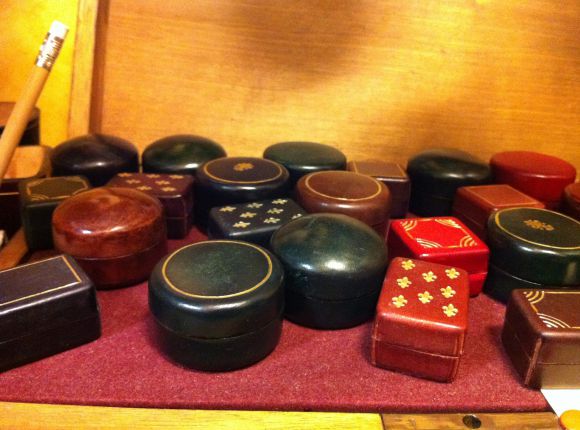
Leather pillboxes, coming in different shapes, have an average cost of 25 euros (40 euros, if decorated in silver), while jewelry cases, another most wanted present at Frizzoni’s, cost up to 550 euros; but the price can vary, according to dimensions and refinement (e.g. suede lining and inside removable trays contribute to the price rise). The Frizzoni store is located at Via Por Santa Maria, 62/R and open daily from 9 am to 7 pm.
13. Mosaic Tiles

Masters Bruno and Jacopo Lastrucci were able to maximize the realism in mosaic art by taking the human form in stone to perfection, thus filling a long-standing gap in the evolution of mosaic art. One of Bruno’s most charismatic masterpieces, the portrait of J.F. Lizzadro, is exhibited at the Lizzadro Museum of Lapidary Art, in Elmhurst, near Chicago. Their workshop, located at Via De’ Macci, 9, is also a museum with a private collection in which some of the authentic unique masterworks are priceless. Besides the creation of “stone paintings”, Lastrucci’s “Florentine commesso” is also used in jewelry (to make pendants or earrings, for example), in table or other furniture decorations, and can be applied to precious jewels cases.
Its perfection, requiring several months of work, comes from the use of original Tuscan stones and the ability of the masters to put them together, as if they were all part of a unique rock, and then polish to create masterpieces so much resistant to be eternal. Pricing for a small Lastrucci mosaic starts at around 300 euros (wall tiles depicting contemporary subjects). Their workshop museum is open Tue-Sat from 10 am to 6 pm, but call first (tel. 055 241653) if you want to take advantage of an exclusive guided tour.
14. Florentine Olive Oil

Do not hesitate to ask for suggestions directly to the Conti family; they’ll be more than happy to transfer all their knowledge on how to use olive oil in cookery, providing you with original recipes from the Tuscan and Italian tradition. A 75 ml can costs around 7.50 euros, while an “extra vergine” oil starts at 9 euros a bottle. Stefano Conti’s stand follows the Mercato di San Lorenzo opening times and is, therefore, closed on Sundays and Mondays. Tue-Sat it is open from 9 am to 7 pm.
15. Fiorentina FC Merchandise

Other items you may want to consider as original Fiorentina gifts are umbrellas (15 to 23 euros, depending on size), scarves (15 euros), flags (11 euros), mugs (8 euros), hats (13 to 15 euros) or key rings (11 euros). You can find them all at Alé Viola (Via del Corso, 58/R) or at Viola Point (Via Mameli 2b). The stores are open Mon 3-7.30 pm, and Tue-Sat from 10.30 am to 1.30 pm and from 2.30 to 7.30 pm.
16. Photography

The Alinari photographs are contact-printed or enlarged from the original glassplate negatives, housed in the historic archive, through the same manual technique of reproduction used during the 19th century, allowing the realization of remarkably sharp images of any size. Prints sizes can reach 70 x 100 cm (27.56' x 39.37') or, upon request, can be realized in mural size. All prints are black and white, or turned to sepia, and come on special photographic paper, framed in elegant passepartout, or mounted on wooden frames, to make them absolutely prestigious presents. Medium-size reproductions of Italian ancient views cost around 33 euros, but larger prints, coming from famous photographers whose glassplate negatives belong to the archive, can cost up to 250 euros.
Other Interesting Souvenirs from Italy
If you are nowhere near Italy and have no chance to get there any time soon, or simply have no spare room in your luggage en route home from this country, these days you can find a wide selection of authentic and truly interesting Italian souvenirs online. Presented here are some of the top Italian products sought by foreign visitors, now available online for your convenience.
2. Formaggio (Cheese) - Italian cheeses are second to none, be it French, Swiss or Dutch counterparts, neither in quality nor in taste. Some of the local cheese names, like Parmigiano or Mozzarella, have long become generic terms in the world of culinary.
3. Murano Glass - Made from silica, soda, lime and potassium melted together, originated on the Venetian island of Murano, Murano glassware is renowned for its beautiful distinctive color, shape and patterns, all of which make it a rather unique and whimsical element of home decoration.
4. Italian meats - Out of a huge choice of meats present on the Italian market, there are some that stand out in particular, namely: Prosciutto (Italian: ham) – sweet and delicate ham which is safe to eat raw due to its elaborate curing process; Salami - a cured sausage made of fermented and air-dried meat, usually beef or pork; Bresaola - air-dried, salted meat (beef, horse, venison or pork), aged for a few months until hard and dark red (almost purple) in color. Originated in Valtellina, Lombardy in northern Italy.
5. Italian sweets - These are numerous, just as any other type of food in Italy. Some of the snacks worth considering include: Sperlari Galatine Milk Candy - famous Italian sweet made with 80% real milk, yogurt and a bit of honey. With less than 5% fat, it is quite healthy for children and adults alike; La Florentine Torrone is an authentic Italian treat, comprising toasted almond honey nougat, lemon, orange & vanilla flavor assortment prepared by an original old recipe from the finest ingredients, such as crunchy almonds, smooth golden honey, pure can sugar, and fluffy egg whites, and enriched by flavors squeezed out of the ripest oranges, lemons and vanilla beans. Savoiardi (or Lady Fingers) - a key ingredient in many desserts including, most notably, Tiramisu.
7. Limoncello -The Italian lemon liqueur originally produced mainly in southern Italy. In the north of Italy, where it is also made nowadays, this liqueur is often called limoncino. Today, Limoncello has become the second most popular Italian liqueur, after Campari. Traditionally, limoncello is made from the zest (peels without the pith) of Femminello St. Teresa lemons which is steeped in rectified spirit (usually grappa, but vodka can be used just as well) until the oil is released.
Walking Tours in Florence, Italy
Create Your Own Walk in Florence
Dante's Florence Walking Tour
Tour Duration: 1 Hour(s)
Travel Distance: 2.1 Km or 1.3 Miles
Duomo Walking Tour
The most prominent of these, undoubtedly, is the breathtaking... view more
Tour Duration: 2 Hour(s)
Travel Distance: 2.8 Km or 1.7 Miles
Florence Introduction Walking Tour
The... view more
Tour Duration: 2 Hour(s)
Travel Distance: 4.1 Km or 2.5 Miles
